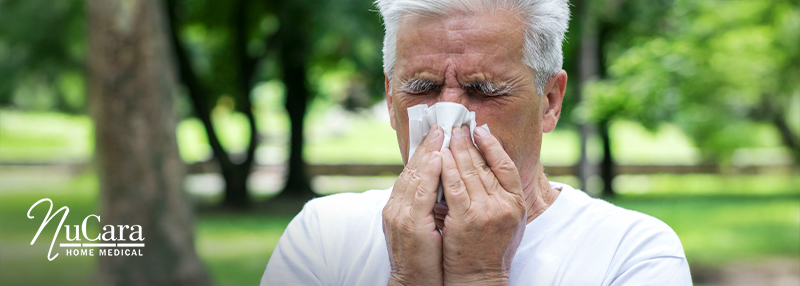NuCara Home Medical
Updated Wed November 26, 2025
Published Under: Sleep Apnea

Ahh, spring is here, bringing warmer weather, blooming flowers—and for many, seasonal allergies! If you have sleep apnea, allergy season can make it even harder to get a good night’s rest. Nasal congestion, sneezing, plus sinus pressure can disrupt your breathing, worsening sleep apnea symptoms and making CPAP therapy more challenging.
At NuCara Home Medical, we want to help you take control of your sleep. Keep reading to learn how allergies affect sleep apnea and what you can do to minimize their impact.
How Seasonal Allergies Worsen Sleep Apnea Symptoms
Seasonal allergies can significantly worsen the symptoms you experience from sleep apnea, making it even harder for you to enjoy a restful night of sleep. The most significant way seasonal allergies can impact your sleep apnea symptoms is through nasal congestion.
Allergens work their way into the nasal passages, causing inflammation and swelling that can lead to an increase in mucus build-up and congestion. This makes it difficult for you to breathe through your nose. That difficulty often leads to individuals being forced to breathe through their mouths, which dries out the throat and exacerbates sleep apnea symptoms.
This inflammation, and the domino effect it has on breathing, can lead to an increase of swelling in the throat, which in turn narrows the airway and can lead to an increased risk of airway collapse – the defining feature of obstructive sleep apnea (OSA).
Seasonal Allergies Can Disrupt CPAP Therapy
If you use CPAP therapy to manage your sleep apnea, nasal congestion can make it difficult to keep up with treatment. A blocked nose can create resistance against your CPAP airflow, making it feel uncomfortable or ineffective. This can lead to inconsistent use—which can be dangerous for your sleep health.
To help you stay on track, NuCara Home Medical offers automatic positive airway pressure (APAP) devices that can adjust to your changing needs, as well as full-face mask options that allow for mouth breathing without reducing therapy effectiveness.
Browse Our PAP Products
4 Tips to Reduce Allergy Symptoms & Improve Sleep Quality
Managing your allergies is key to ensuring your CPAP therapy remains effective. Here’s what you can do:
1. Create an Allergen-Free Bedroom
It seems obvious, but the best way to avoid feeling the impact of allergies is to avoid allergens altogether. In a perfect world, this would be possible, but that’s not the reality we live in. However, there are still ways you can minimize your exposure.
- Wash your bedding regularly with hot water to eliminate dust mites.
- Use hypoallergenic mattress covers and pillows.
- Consider a dehumidifier to discourage mold growth in your room.
2. Use Over-the-Counter Allergy Medications (With Doctor Approval)
If your seasonal allergies are particularly bad, you could benefit from the regular use of over-the-counter allergy medicines.
- Antihistamines and corticosteroids have been shown to improve breathing by reducing allergy symptoms.
- Always consult your doctor before starting a new medication, especially if you have existing health conditions.
3. Improve Your Indoor Air Quality
It’s important that your entire home has clean air, not just your bedroom.
- Use an air purifier with a HEPA filter to remove airborne allergens.
- Regularly vacuum carpets, clean upholstery, and dust surfaces to minimize allergens.
4. Practice Good Sleep Hygiene
One of the best ways to improve your sleep quality is to ensure you’re practicing good sleep hygiene.
- Take care to establish a regular sleep schedule and routine.
- Put the phone away when it’s time for bed and create a relaxing bedtime environment.
- Ensure your windows are closed during periods of increased allergen production.
- Shower before bed to remove allergens that have stuck to your skin or hair during the day.
While following these steps won’t completely remove the impact that allergens have on your sleep apnea symptoms, it can go a long way towards reducing them and improving the overall quality of your sleep.
If allergies are making CPAP therapy difficult, we can help. Contact NuCara Home Medical today to explore CPAP machines, CPAP mask options, heated humidifiers, and other solutions that make breathing easier.
Explore CPAP Equipment & Supplies Online
Comments